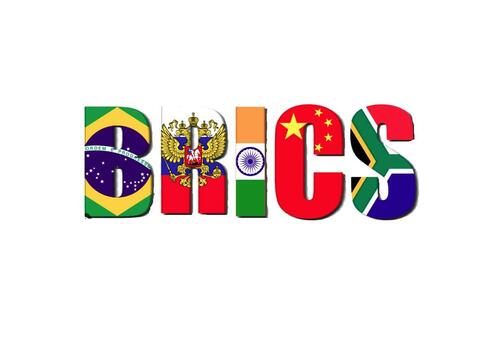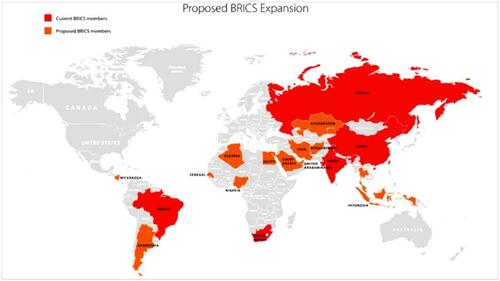
More and more countries have aspired to belong to BRICS since 2009, but none from the West.
The BRICS countries represent 40% of the world population and 25% of the global GDP.
Thanks to BRICS, China can impose its vision of international cooperation and Russia can show that it will not be isolated on the stage of global players.
The group is a thorn in the side of the Americans all the more so that a dozen other developing countries (marked in orange on the map below) want to join the current five countries of the alliance (red).
Source: Silkroadbriefing
What America certainly doesn’t like is the fact that French President Macron communicated the other day his interest in attending meetings of the alliance. France in BRICS would be a trigger for profound changes in the geopolitical landscape. We bet that Turkey can also join soon, which, like the case of France, will weaken the importance of the UN as a purely Anglo-Saxon project and that of NATO. Indeed, the BRICS countries are against the UN’s attempts to link the issues of climate with the issues of security, and France in BRICS can return to the de Gaullean concepts of foreign policy outside NATO.
A challenge to cohesion in BRICS is the large disparity in countries’ capacities (in favor of China) and the members’ focus on cooperation with the PRC, which results in a smaller number of relationships among the other partners. However, the main factor that has weakened the BRICS in recent years is the deterioration of relations between the largest member states, China and India, since 2017. Border and trade disputes culminated in the clashes on the Ladakh border in June 2020, which almost led to the cancellation of the BRICS summit in the same year and prompted India to deepen cooperation with the United States and the EU.
Now, the West’s involvement in the war in Ukraine is reviving anti-Western sentiments, not only in the BRICS countries.
Indeed, it is clear to more and more countries that the war was provoked by NATO’s excessive expansion.
The BRICS politicians also want to fight inflation whose cause they perceive not in the Russian attack but in the Western sanctions.
Whether you are pro-Western, pro-Russian, or in favor of the New Silk Road, it is better for all of us to live in a multi-polar world rather than to have all the strings pulled on the Potomac.
More and more countries have aspired to belong to BRICS since 2009, but none from the West.
The BRICS countries represent 40% of the world population and 25% of the global GDP.
Thanks to BRICS, China can impose its vision of international cooperation and Russia can show that it will not be isolated on the stage of global players.
The group is a thorn in the side of the Americans all the more so that a dozen other developing countries (marked in orange on the map below) want to join the current five countries of the alliance (red).
Source: Silkroadbriefing
What America certainly doesn’t like is the fact that French President Macron communicated the other day his interest in attending meetings of the alliance. France in BRICS would be a trigger for profound changes in the geopolitical landscape. We bet that Turkey can also join soon, which, like the case of France, will weaken the importance of the UN as a purely Anglo-Saxon project and that of NATO. Indeed, the BRICS countries are against the UN’s attempts to link the issues of climate with the issues of security, and France in BRICS can return to the de Gaullean concepts of foreign policy outside NATO.
A challenge to cohesion in BRICS is the large disparity in countries’ capacities (in favor of China) and the members’ focus on cooperation with the PRC, which results in a smaller number of relationships among the other partners. However, the main factor that has weakened the BRICS in recent years is the deterioration of relations between the largest member states, China and India, since 2017. Border and trade disputes culminated in the clashes on the Ladakh border in June 2020, which almost led to the cancellation of the BRICS summit in the same year and prompted India to deepen cooperation with the United States and the EU.
Now, the West’s involvement in the war in Ukraine is reviving anti-Western sentiments, not only in the BRICS countries.
Indeed, it is clear to more and more countries that the war was provoked by NATO’s excessive expansion.
The BRICS politicians also want to fight inflation whose cause they perceive not in the Russian attack but in the Western sanctions.
Whether you are pro-Western, pro-Russian, or in favor of the New Silk Road, it is better for all of us to live in a multi-polar world rather than to have all the strings pulled on the Potomac.
Loading…




